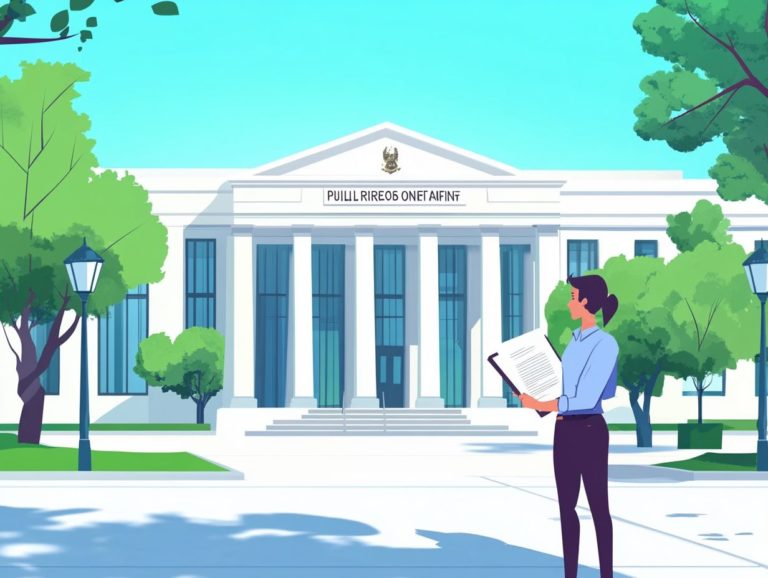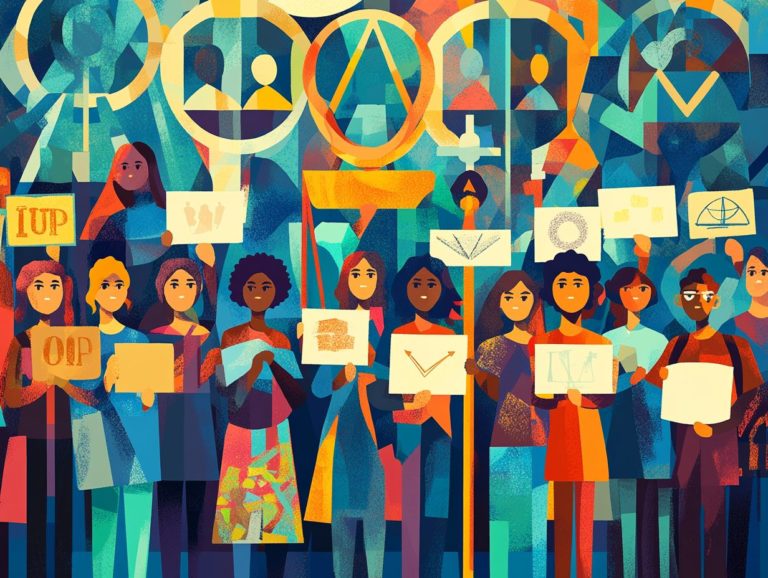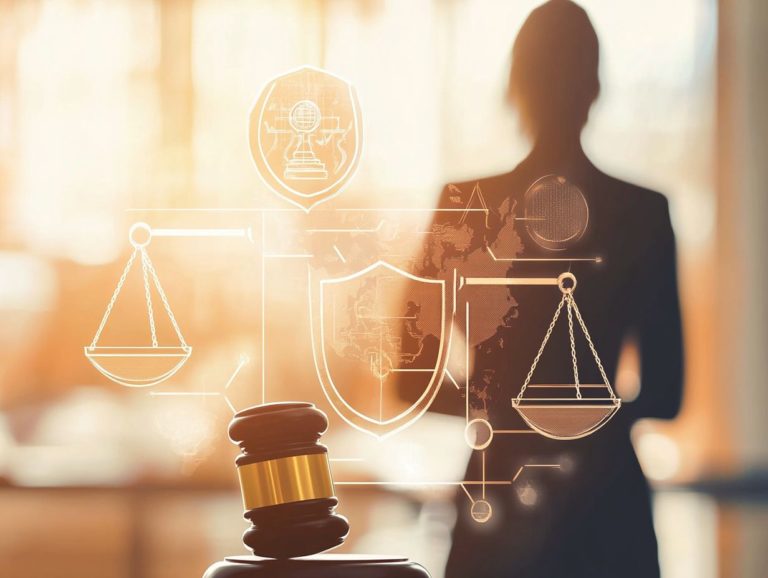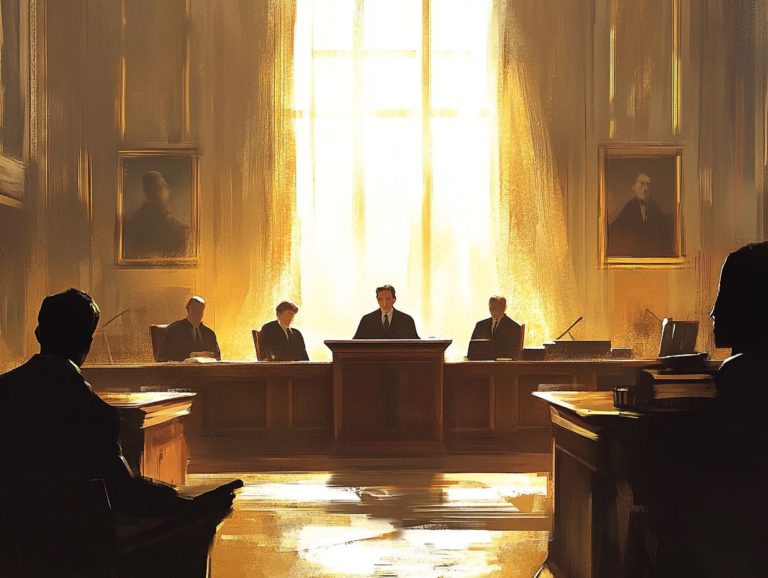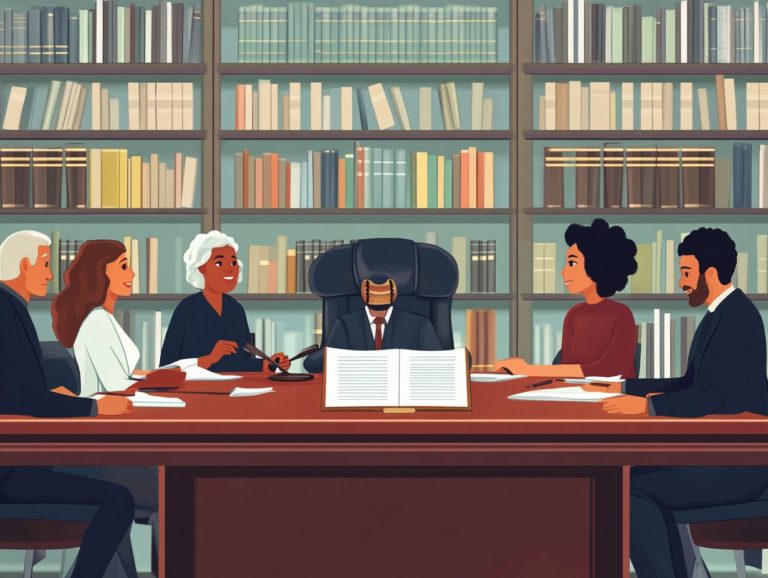The Right to an Interpreter in Court
Navigating the legal system can feel overwhelming, especially when language barriers arise. An interpreter is essential to ensure that everyone understands the proceedings, promoting fairness and justice.
This article delves into your legal rights to an interpreter and highlights relevant laws and regulations. It also pinpoints specific scenarios where their presence is crucial.
We examine the qualifications required for court interpreters, the challenges they face, and how technology is transforming the future of court interpretation. Discover the vital role interpreters play in maintaining the integrity of the judicial process.
Contents
- Key Takeaways:
- The Importance of an Interpreter in Court
- Legal Rights to an Interpreter
- When an Interpreter is Required
- Qualifications and Training for Court Interpreters
- Challenges and Solutions for Court Interpreters
- The Role of Technology in Court Interpretation
- Frequently Asked Questions
- What is the right to an interpreter in court?
- Who has the right to an interpreter in court?
- How can someone request an interpreter in court?
- Is an interpreter provided for free in court?
- What if an interpreter is not available for a specific language?
- What should I do if an interpreter is not provided or is not qualified?
Key Takeaways:

- Access to an interpreter in court is a legal right.
- Interpreters ensure fairness and understanding, especially for non-English speakers.
- Court interpreters must possess specialized skills and knowledge.
- Technology can help overcome language barriers, though limitations exist.
The Importance of an Interpreter in Court
In the U.S. legal system, having access to a qualified court interpreter is essential for ensuring your constitutional right to fair legal processes, especially if you have limited English proficiency.
The ACLU Georgia highlights that without effective language assistance, you may struggle to fully grasp the proceedings. This can severely compromise your right to a fair trial.
This concern spans various judicial contexts, including criminal trials, where misunderstandings can lead to serious consequences.
Ensuring Fairness and Understanding
Court interpreters are vital for fairness in legal cases, particularly for defendants who speak Mandarin Chinese or other languages. They facilitate clear communication between defendants and their legal counsel, significantly impacting the legal process.
This need is clear in important cases like Ling v. Georgia, where inadequate interpretation services exposed significant weaknesses in the legal system. The Georgia Supreme Court ruled that effective communication is crucial for a defendant’s ability to engage with their defense strategies.
By bridging communication gaps, interpreters enable defendants to express their needs, understand the charges against them, and actively participate in their trials. The court s acknowledgment of interpreter rights champions a fairer legal process and reinforces the commitment to ensuring that language barriers do not undermine justice.
Legal Rights to an Interpreter
Your legal right to an interpreter is firmly established in both federal and state laws. Title VI of the Civil Rights Act guarantees your right to language assistance in judicial proceedings, ensuring effective assistance of counsel and clear communication in the legal system.
Laws and Regulations
Laws and regulations govern the provision of interpreters in court, shaped by federal judiciary mandates. Organizations like the ACLU champion compliance and fairness in judicial proceedings, supported by legal experts such as Azadeh Shahshahani and Jennifer Chang Newell.
These mandates ensure individuals with limited English proficiency have equal access to the judicial system, safeguarding their rights throughout the legal process. At the federal level, the Court Interpreters Act and Title VI of the Civil Rights Act underscore the necessity for qualified interpreters.
States have tailored these guidelines to meet local needs, resulting in a diverse array of interpreter certification programs and language access policies. Advocacy groups play a crucial role in monitoring these regulations, ensuring that courts adhere to legal standards.
This vigilance protects individual rights and upholds the integrity of the entire judicial process.
If you or someone you know needs an interpreter, take action now your rights matter!
When an Interpreter is Required
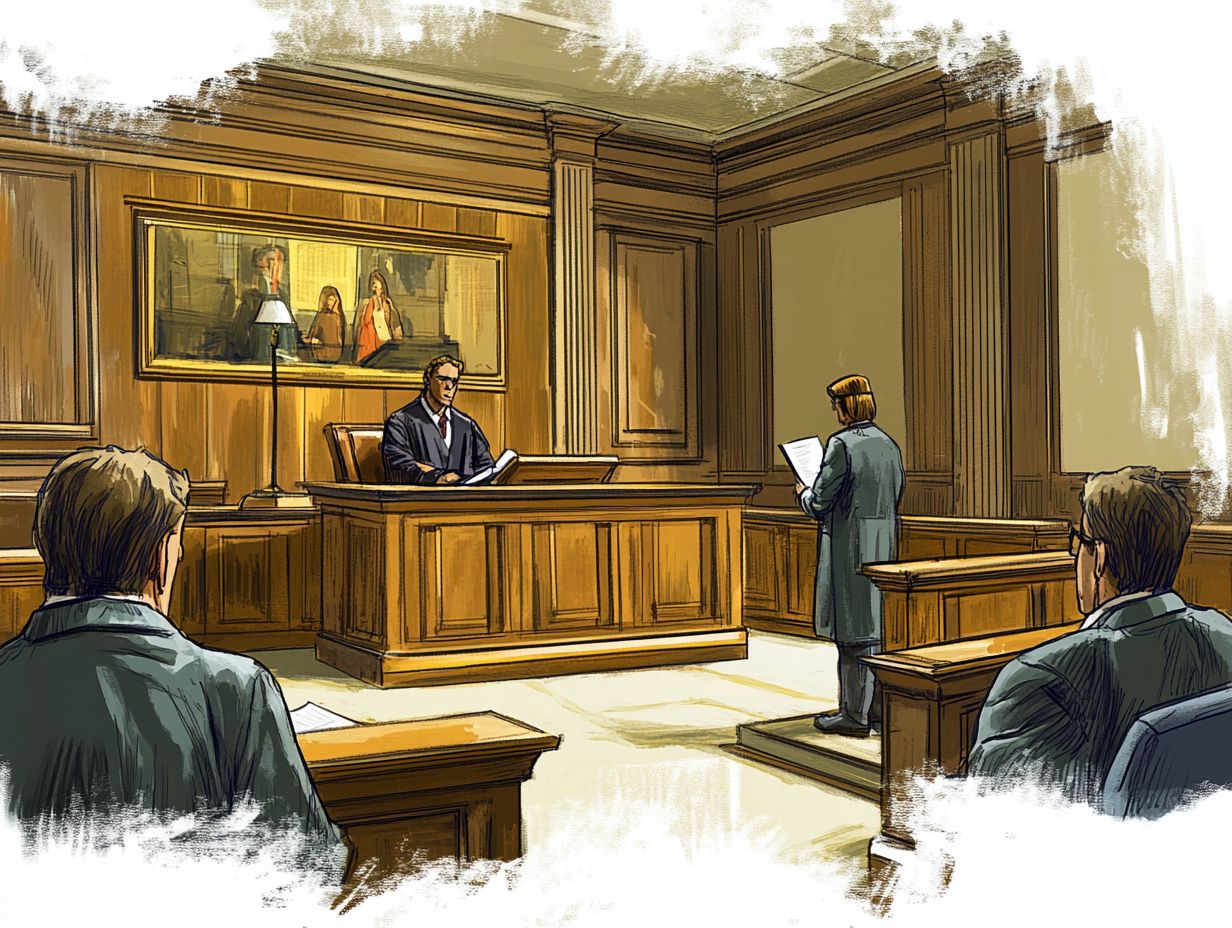
An interpreter is essential in many situations, especially during criminal trials and judicial proceedings where language barriers block effective communication.
This role is crucial for upholding the right to a fair trial, ensuring that everyone involved can understand and participate in the process.
Cases and Situations that Require an Interpreter
Cases like Ling v. Georgia show the need for language interpreters, emphasizing the constitutional right to due process for individuals with limited English skills in the courtroom.
In this case, the lack of a qualified interpreter blocked the defendant from understanding the proceedings, leading to significant misunderstandings that could have swayed the trial’s outcome.
Similar challenges arise in People v. Pineda, where insufficient language support left the accused struggling to communicate with his attorney, ultimately affecting the jury s perception of his credibility.
These examples reveal a troubling pattern where non-English speakers risk an unfair trial, raising serious concerns about the legal standards that highlight the necessity of interpreters in protecting rights and ensuring that justice is accessible to everyone.
Qualifications and Training for Court Interpreters
Court interpreters play a crucial role in the judicial system.
To excel in this role, you must have specialized qualifications and undergo extensive training. This preparation helps you navigate the complex landscape of legal terms and procedures in various judicial proceedings.
Skills and Knowledge Needed
To assist effectively, language interpreters must have a strong command of both languages, an understanding of legal concepts, and undergo rigorous training to master courtroom dialogue. Being fluent in two languages is not enough.
As a court interpreter, you should be familiar with legal terminology, as any misunderstanding could have serious consequences in legal proceedings. Cultural competence is equally important, enabling you to convey nuanced meanings influenced by cultural contexts.
Various training programs are available, from certificate courses to specialized workshops, focusing on language skills and ethical standards in the legal field. These programs are vital in preparing you to perform your duties effectively while upholding the integrity of the judicial process.
Challenges and Solutions for Court Interpreters
Court interpreters face various challenges, from language barriers to cultural misunderstandings, all while under pressure to convey nuanced legal information accurately.
We need innovative solutions to enhance effectiveness in the courtroom!
Overcoming Language Barriers
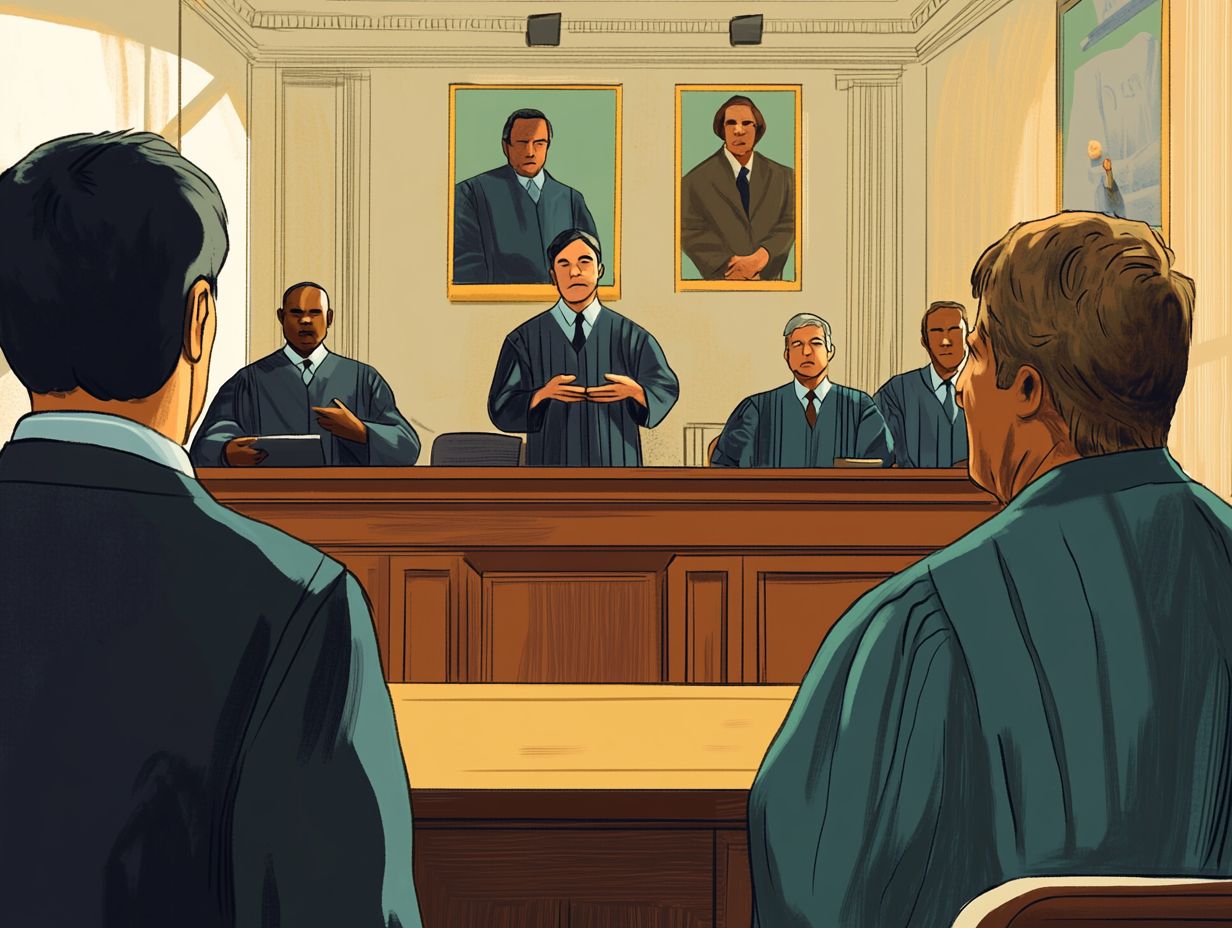
Overcoming language barriers is vital for court interpreters, ensuring that everyone in a legal proceeding can understand and engage fully. This is key to maintaining the integrity of the judicial process.
To achieve this goal, you rely on specialized glossaries tailored to legal terminology, helping convey precise meanings during testimony or legal arguments.
Engaging in collaborative approaches with legal teams fosters open communication, allowing briefings that clarify nuances in language and context.
Integrating technology, such as real-time translation applications, also plays a crucial role in facilitating immediate communication.
By employing these strategies, you not only enhance the clarity of proceedings but also contribute significantly to a more equitable judicial system, ensuring that every participant has a fair chance to express themselves.
The Role of Technology in Court Interpretation
Technology has become essential in court interpretation, providing advancements that enhance communication.
However, it also presents limitations that need careful consideration to ensure effective language services are upheld.
Advancements and Limitations
Advancements in technology have transformed court interpretation, providing quicker and more efficient language services. However, limitations exist, such as technical issues and the absence of non-verbal cues, which can impact the quality of interpretation.
Take video remote interpreting (VRI), which allows courts to connect with interpreters via video. This tool enables courts to access interpreters from various locations almost instantaneously, significantly enhancing efficiency in urgent cases that demand immediate linguistic support. Yet, it isn’t without drawbacks. Connectivity issues can compromise the accuracy of interpretation or even disrupt communication altogether.
In high-stakes trials where emotional context is crucial, relying solely on technology can lead to missed nuances of body language or gestures that could alter the interpretation of a statement. Striking a balance between these technological tools and traditional face-to-face methods is essential. This balance keeps court proceedings fair and clear for everyone involved!
Frequently Asked Questions
What is the right to an interpreter in court?
The right to an interpreter in court is the right of a non-English speaking or hearing-impaired individual to have an interpreter present during legal proceedings to ensure full and equal access to justice.
Who has the right to an interpreter in court?

Anyone involved in a court case who has limited English proficiency or is hearing-impaired has the right to an interpreter. This includes defendants, witnesses, and victims.
How can someone request an interpreter in court?
A request for an interpreter must typically be made in advance. This can be done by informing the court during the initial stages of legal proceedings or by contacting the court’s interpreter services department.
Is an interpreter provided for free in court?
Yes, an interpreter is provided free of charge for those who have the right to one. This ensures that language barriers do not prevent individuals from fully understanding and participating in the legal process.
What if an interpreter is not available for a specific language?
If an interpreter for a specific language is not available, the court must provide a qualified interpreter through other means, such as telephonic or video interpreting services.
What should I do if an interpreter is not provided or is not qualified?
If an interpreter is not provided or is not qualified, it is critical to inform the court immediately. You have the right to a competent interpreter, and the court must take the necessary steps to ensure that your rights are protected.
If you or someone you know needs an interpreter, don t wait reach out to your local court for assistance!

